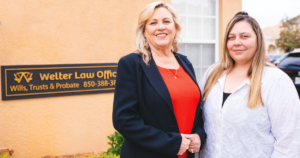
By Matt Wiley
Pasco County Tax Collector and former Florida State Senator Mike Fasano is not a fan of changing the way the county’s government is structured and Fasano wasn’t afraid to voice his opinion during the second meeting of the advisory committee that’s currently weighing the options of changing to a charter form of government.
Since January, the future of Pasco County’s governmental structure has been debated, following a seemingly random push by future Speaker of the Florida House, Dist. 37 Rep. Richard Corcoran (R-Land O’Lakes), who insisted to the Board of County Commissioners (BOCC) that changing the county’s current structure would be in Pasco’s best interest.
Rep. Corcoran said that a charter form of government would put more power in the hands of the county’s voters by allowing for single-member districts (instead of all five commissioners being elected county-wide), voter recall of constitutional officers, an elected county mayor/administrator and term limits. None of those provisions are possible under the current structure, because local non-charter governments in Florida can be changed by the state legislature.
To further explore the charter idea, the BOCC appointed a Charter Advisory Committee (CAC) of 15 local residents, 10 appointments by the BOCC and one each by the five members of Pasco’s state legislative delegation in Tallahassee, to explore whether or not to move forward with forming a charter form of government. Among the appointees is former Pasco administrator John Gallagher, who served in the county’s top job for 30 years. However, before deciding whether to recommend moving forward with a charter, the committee is in the process of hearing from each of the constitutional officers (the property appraiser, tax collector, clerk of court, supervisor of elections and the sheriff) to learn how each office works. At its most recent meeting on June 22, the CAC heard from Fasano and Pasco property appraiser Mike Wells.
Following Wells’ discussion about his office, Fasano went through a short presentation about all of the services that his office’s five locations provide, including the newest location off Wesley Chapel Blvd. in ComPark 75 in Lutz. However, the conversation quickly turned to what he thought about forming a charter government.
“I was hoping that the first group of people who would come before this body would be those who are pushing for charter government,” Fasano said. “I understand that there aren’t many people out there (pushing for this). I have a hard time coming up here saying why we shouldn’t be doing something when there’s no one coming forward to say why we should.”
He added, “Is the process broken? Is the system broken? Is charter government going to give more money to a specific entity than they’re getting now? No. What those that are pushing (for this) will create is more government and more layers of (county) government.”
Fasano explained that the boasted benefits of a charter are actually quite expensive. In fact, he said, creating single member voting districts alone could cost the county and the supervisor of elections office close to $1 million more each election to pay for more polling places and the cost of staffing them.
However, he did make a suggestion if the committee decides to move forward with forming a county charter.
“The best thing you can do is make our constitutional officers run nonpartisan,” Fasano said. “Do you really need a partisan tax collector or property appraiser, sheriff or clerk of courts? I don’t raise or lower taxes, I (only) collect them.”
Right now, the county ‘s government is comprised of five commissioners (who are elected county-wide, without term limits) and a BOCC-appointed county administrator. The current government structure derives its power, or “home rule,” from the state legislature.
According to the Florida Association of Counties (FAC), which conducted a workshop with the BOCC before the committee was appointed) a charter county is a county whose citizens have approved a local charter, granting the county government “home rule” authority (as directly provided in the Florida Constitution), as opposed to the legislature having that power. A charter would provide the county with the potential for government reform at the county level. Choices made in the charter are dictated by and voted on by the local community.
A charter also allows county residents to choose their form of government and gives the county power to tax in unincorporated areas. It also gives voters the power to alter the functions of county officers (e.g., term limits and single-member districts) and the power to have an elected county executive. Any amendments to the charter must be approved by voters on a ballot, which limits the county’s power. A charter also has the potential to increase citizen involvement by allowing for the recall of county officers and the option for citizen petitions to make amendments to the charter.
Currently, there are 20 counties in Florida with charter governments, including Hillsborough and Pinellas. Pasco is the largest county in the state without a charter government.
The CAC is scheduled to meet twice per month for 18 months to decide whether to create a charter, actually create the charter and bring it before the BOCC to approve for the November 2016 ballot — or deny the concept altogether.
For more info, please visit PascoCountyFl.net. — MW




No comment yet, add your voice below!